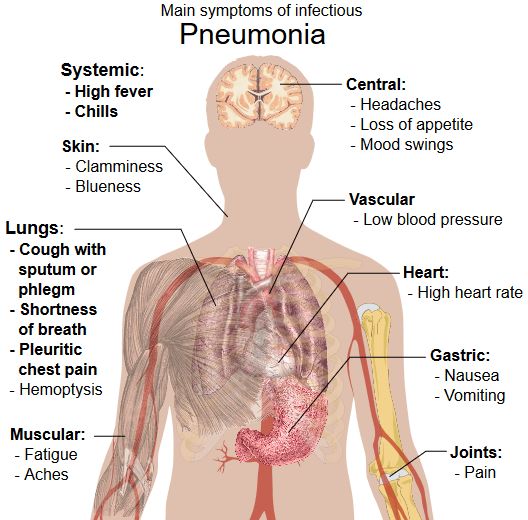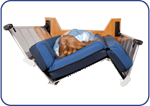Learn How The Freedom Bed™ Helps With Pneumonia Prevention For Those With Immobility
 Pneumonia is an inflammatory infection taking root in the lungs, affecting small air sacs known as alveoli, tiny hollow cavities that serve to exchange carbon dioxide gases to and from the bloodstream. This type of infection can seriously affect individuals on extended bed rest, or who experience long-term immobility. Pneumonia effectively causes inflammation in these small cavities and fills them with pus, causing chest infections, excessive fluid buildup and respiratory problems that are complex issues to treat in immobilized individuals.
Pneumonia is an inflammatory infection taking root in the lungs, affecting small air sacs known as alveoli, tiny hollow cavities that serve to exchange carbon dioxide gases to and from the bloodstream. This type of infection can seriously affect individuals on extended bed rest, or who experience long-term immobility. Pneumonia effectively causes inflammation in these small cavities and fills them with pus, causing chest infections, excessive fluid buildup and respiratory problems that are complex issues to treat in immobilized individuals.
Prolonged immobility and extended bed rest both increase the risk of pneumonia and lung collapse when fluids build up in the lungs. If the muscles are not working to remove excess fluid from the body, this can cause:
 Blood to pool in the chest area
Blood to pool in the chest area
 Shallow breathing
Shallow breathing
 Decreased lung volume
Decreased lung volume
 Weakened abdominal core
Weakened abdominal core
 Mucus buildup and pooling in the lungs
Mucus buildup and pooling in the lungs
Pneumonia requires medical treatment, usually via antibiotics based on what type of pneumonia you may have. In addition to this, there are some outside factors like age, symptoms, allergies and resistant bacteria that can lead to complications with pneumonia. Most cases of bacterial pneumonia are caused by Streptococcus pneumoniae and Mycoplasma pneumoniae.
Most treatments are highly successful, yet the disadvantage of having to lay flat on one’s back does not lend itself well to the recovery process for disabled persons. The inability to turn frequently prolongs the symptoms and suffering associated with such a strong lung infection.
The medications used typically begin to help within 1-3 weeks, although with a weakened immune system, it can take up to 6-8 weeks to clear. Pneumonia treatments are meant to manage chronic complications including further respiratory infection. However, they do not address some of the outside factors that cause these symptoms to resurface periodically in those with long-term immobility.
When left untreated, pneumonia in immobilized individuals can contribute to a weakened immune system, and a failure of the lungs to filter out harmful germs and bacteria. The infection also decreases the ability of your alveoli to help oxygen reach the blood, preventing cells from working properly. Pneumonia affects thousands of patients yearly, more specifically immobile, elderly, and young children, and can result in death if not treated properly. - See the cost vs. benefits
Medical Bed For Pneumonia Prevention
 The primary goal and function of the ProBed Freedom Bed is to inherently reduce the potential health challenges associated with those affected by quadriplegia and paraplegia. Eliminating these challenges not only improves overall health, but also vastly restores dignity, sense of identity, functional independence, and the ability to manage other complications.
The primary goal and function of the ProBed Freedom Bed is to inherently reduce the potential health challenges associated with those affected by quadriplegia and paraplegia. Eliminating these challenges not only improves overall health, but also vastly restores dignity, sense of identity, functional independence, and the ability to manage other complications.
With pneumonia, the benefits of a rotating bed system are vast. Using lateral rotation therapy allows the individual to continually adjust and customize their position, helping decrease and eliminate the pooling of fluids, mucus, and blood in the chest cavity. This contributes to a decreased likelihood of continued respiratory infection.
The Freedom Bed is a fully customizable, computer-controlled, kinetic sleep therapy system designed specifically with paraplegic and quadriplegic care in mind. The bed uses powerful and quiet motors and air-powered raising systems to automatically turn and reposition users into new and beneficial sleep positions without the help of caregivers or facility staff. The air-powered leg and torso raising systems are the perfect ally in supporting pneumonia afflicted users, by comfortably and easily raising them into a sitting position, allowing fluid to be more easily liberated from the lungs and chest.
Not only does the Freedom Bed dramatically improve sleep cycles and overall quality of life, but it is capable of reducing health risks associated with pneumonia, restoring function and blood flow to compressed tissues, and preventing further immobility-related complications.
Fortunately, pneumonia is a treatable infection. Modern medicinal practices and research continue to find new antibiotics and treatments to combat the spread of infection, helping users experience reduced anxiety, and fuller, happier lives. Use of the Freedom Bed further assists these medical advancements by allowing immobile individuals to position themselves in ways that help them combat the infection, reducing recovery time and providing a unique sense of dignity, and independence.

